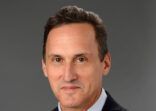A soft landing for the US economy in 2024 remains likely, and after the technology-stock led surge in equity markets this year, corporate earnings will be the main driver, according to Daniel Morris, chief market strategist and co-head Investment Insights Centre, BNP Paribas Asset Management, London.
However, the US Federal Reserve is still anxious about inflation, so it will be wary of cutting interest rates until the second half of the year. US core inflation (core ex shelter) has averaged 1.9% for the last four months, but average hourly wage increases at over 4% are too high and need to fall to 3.5%; in Europe wage increases at 5% are even more worrying, he argued.
In this environment, bonds will be stuck in a range, while real (rather than nominal) yields should be the main focus for investors, he told a media briefing in Hong Kong on Tuesday.
As a result, Morris (main picture) is “overweight US yields”, with “greatest conviction” for US structured bonds and US TIPS (Treasury Inflation-Protected Securities). He also likes European investment grade credit because of historically high yield premia, but is avoiding high yield corporate bonds.
“The most immediate factors driving yields lower include moderating core inflation, weakening consumer demand, tightening credit standards and faltering global growth,” said Morris.
Nevertheless, other factors militate against falling bond yields.
He warned about US GDP growth still surprising to the upside, a hawkish Fed, loose fiscal policy, large quarterly refunding and quantitative tightening.
Moreover, higher GDP trend growth as AI is adopted in many industries, debt sustainability worries, and structural inflation risks from deglobalisation and energy transition” could mean that yields remain stubbornly high in the long term.
The Fed’s message of “higher for longer” has finally been received, and now markets are worried about government debt levels, he noted.
Corporate earnings take centre stage
Meanwhile, there are positive corporate earnings growth expectations across most sectors in the US and Europe, with consensus estimates for 11-12% corporate earnings gains in the US (less in Europe) next year, which is in the “average range”.
Yet, earnings growth estimates are too high if a recession materialises, he warned. “Europe is the weakest link, despite European stocks being cheap on a price-earnings basis compared with the US”.
“The risk to returns is from realised earnings, not revisions,” he said.
Alternatively, investors should seek opportunities in emerging markets. Morris favours emerging market foreign exchange and debt (both hard and soft currency), predicated on a weaker US dollar.
Among equity markets, he noted that is India is replacing China as the big growth opportunity, as Beijing still needs to address imbalances in the economy, problems in the property market and high debt levels, and do more to boost growth.

















